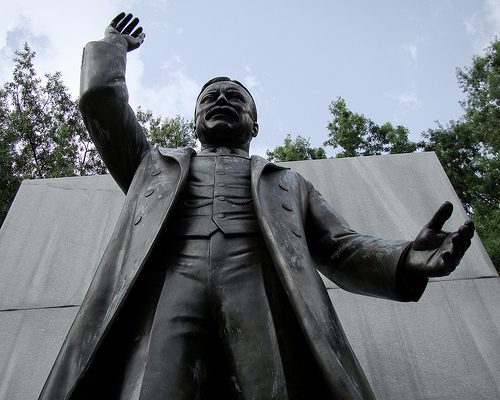
For the past year I have immersed myself in reading about the life of our 26th President, Theodore Roosevelt after a post on The Art of Manliness drew me to this magnetic figure. Roosevelt grew from a fragile boy to a man with boundless energy. He led the Rough Riders to victory in Cuba, ensured the building of the Panama Canal, busted trusts, advocated for the working man, brokered peace between Japan and Russia, wrote over one hundred thousand letters, and participated in the exploration of an unmapped river in the Amazon. Through reading about his life I learned four important lessons.
Cultivate Mind and Body
Sickness and weakness marked Roosevelt’s youngest years. He suffered from frequent panic attacks and some of his earliest memories were of his father carrying him around in the middle of the night while he struggled for breath. While his body suffered from great weakness, he demonstrated strong mental abilities. At the age of twelve his father told him he had a strong mind, but his weak body would hinder its growth. His father encouraged him to strengthen his body so his mind might achieve its fullest potential.
Roosevelt set out to strengthen his body and became a man of great physical ability. He boxed, hiked, rode horses, played tennis, and took part in numerous physical activities. His physical exploits did not decrease his scholastic efforts. He continued to collect and catalog birds while writing many books, the first of which being a history of Naval battles in the War of 1812. In a time when we like to distinguish between those who work and those who learn, his example encourages us to devour books, get into the outdoors, cultivate curiosity, push the limits of our physical abilities, and put our thoughts into writing.
Work Hard at Whatever Your Do
In almost every picture in which he is seated, Theodore Roosevelt’s fists are clinched as if he cannot stand to be still. This stance exemplified the energy he brought to everything he did. He preached about “The Strenuous Life” and frequently called upon people to “get action.” These were not empty words, but the mantra of a man who did not know how to do anything at half-speed. He threw himself into everything he did, taking what many considered to be the most menial tasks with the utmost seriousness.
Roosevelt would be appalled at the passive culture which prevails today. He did not spend his twenties “finding himself,” but instead serving as a state assemblyman in Albany. He used a seemingly meaningless post as a police commissioner to root out corruption in the New York City Police Department. When he served as an assistant to the Secretary of the Navy, he used the opportunity to boost the nation’s naval preparedness. (Something he had strong convictions about because of his study of the War of 1812.) The years after his presidency ended he did not retreat into the sunset. He went on a year-long African safari, campaigned for Republican candidates in New York, ran for President again, started a new political party, and led an expedition to map the “River of Doubt.” (Now known as “Rio Roosevelt.”) The remarkable achievements of his life came as a result of strenuous effort and his life encourages us to do the same.
Use Your Position for the Sake of Others
Teddy Roosevelt was born into a prosperous family and had every reason see the accumulation of more wealth as the greatest ambition of his life. This did not happen though because he saw his father take part in great charitable activities and advocate for those who were less fortunate. His father’s example had a great effect on young Teddy and at every turn in his life he used his growing influence to work for the greater social good.
In the New York Assembly Roosevelt fought against the political machine and at great personal cost sought to lessen the influence money had on politics. He worked to improve conditions and wages for workers, particularly those employed by big business tycoons. He invited Booker T. Washington to dine with him at the White House, earning the permanent scorn of many in the South. These are only a few examples of his labors in this arena, but they call us to look out for the poor and disenfranchised. The idea of people working in dangerous conditions for substandard wages while having no voice in the political process sickened him; and it should produce the same response in us as well.
Avoid Hero Worship
“Even the best of men are men at best.” I do not know the origin of this quote, but we should write it over the lives of every one of our heroes. Roosevelt evidenced many qualities we would be wise to avoid. In particular, he demonstrated an inclination to demonize those with whom he disagreed and this tendency became more pronounced in his later years. His friend William Howard Taft was his choice to succeed him as President and he quickly regretted this decision. Convinced the new President was forwarding the progressive agenda, he ran against Taft for the Republican nomination in 1912 and grew increasingly harsh in his rhetoric towards his former friend. He believed the nomination was stolen from him at the convention in Chicago and he started a third party to run against Taft and Woodrow Wilson in the general election. This decision handed the Presidency to Wilson and left a scar on his friendship with Taft which was not healed until the last year of his life.
When European powers started fighting with each other in 1914, Roosevelt itched for the United States to intervene. He grew impatient with what he saw as the inaction of Wilson and Secretary of State William Jennings Bryan. His heated denunciations of them escalated with each editorial and letter that came from his pen. His inflammatory criticism grew to the point that he forfeited much of the respect and acclaim he previously commanded. Those who pay attention to his life would do well to avoid the hostility he showed towards those with whom he disagreed. While times of conflict will inevitably come, we must be careful not vilify those with whom we disagree. Hateful rhetoric may inflame the passions of those who disagree with us, but it puts the other side on the defensive and alienates those in the middle. To use the Apostle Paul’s language, Roosevelt’s errors remind us to speak the truth in love in hopes that with our gentleness we may win those who differ from us.
Books on Theodore Roosevelt:
The Rise of Theodore Roosevelt by Edmund Morris
Theodore Rex by Edmund Morris
Colonel Roosevelt by Edmund Morris
The Bully Pulpit: Theodore Roosevelt, William Howard Taft, and the Golden Age of Journalism by Doris Kearns Goodwin
Mornings on Horseback: The Story of an Extraordinary Family, a Vanished Way of Life and the Unique Child Who Became Theodore Roosevelt by David McCullough
The River of Doubt: Theodore Roosevelt’s Darkest Journey by Candice Millard
When Trumpets Call: Theodore Roosevelt after the White House by Patricia O’Toole
The Strenuous Life: Essays and Addresses by Theodore Roosevelt











